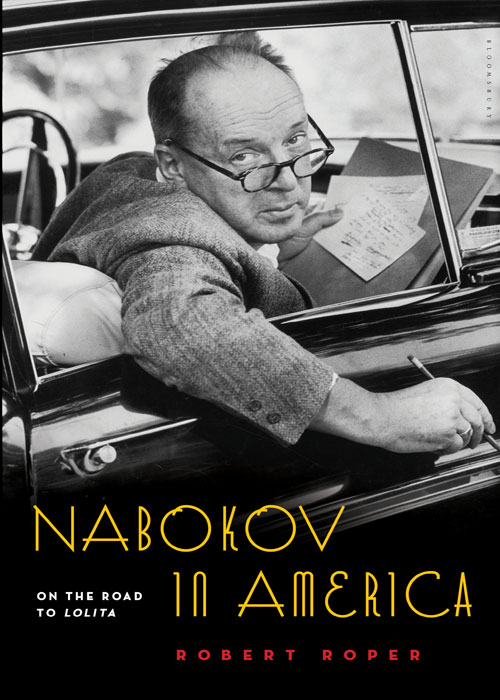
Nabokov in America
On the Road to Lolita
کتاب های مرتبط
- اطلاعات
- نقد و بررسی
- دیدگاه کاربران
نقد و بررسی

April 15, 2015
The Russian writer chased butterflies, and fame, in America. When Vladimir Nabokov (1899-1977) arrived in New York in 1940, fleeing war-torn Europe, he was a struggling writer who hoped to make a living from college teaching. Two decades later, after the American publication of Lolita in 1958, he returned to Europe a literary star. In this fresh and engaging biography, biographer, novelist, and critic Roper (Writing and Film/Johns Hopkins Univ.; Now the Drum of War: Walt Whitman and His Brothers in the Civil War, 2008, etc.) traces the trajectory of his career, friendships, and family life, as well as his indefatigable passion for butterflies. Drawing judiciously on Brian Boyd's Vladimir Nabokov: The American Years (1991) and Stacy Schiff's biography of Vera Nabokov (1999), as well as the writer's correspondence, Roper illuminates such works as Pnin, Speak, Memory, and Pale Fire. Foremost among Nabokov's new American friends was eminent literary critic Edmund Wilson, a trusted reader, who was instrumental in forging publishing connections. Although the friendship eventually ended in bitterness, Roper sees the two men as kindred spirits: "literary out to their fingertips, contentious know-it-alls; sons of upper-class families, their fathers distinguished jurists involved in politics; lovers of Proust, Joyce, Pushkin." Because of Wilson's stewardship, Nabokov found that "cultured, powerful people were magically available to him." Fame, though, did not come quickly. Moving from one teaching job to another-Stanford, Wellesley, Harvard, Cornell-gave Nabokov, Vera, and their son ample opportunity to mount butterfly-hunting expeditions that resulted in a huge collection, which Nabokov donated to the American Museum of National History. Roper traces those journeys, illustrating the book with his own photographs of motor courts where the family stopped and various landscapes that they explored during their 200,000 miles of travels. Although Roper could well have shortened his excerpts from Nabokov's works and letters, they support his assessment of the writer as "an extremely talented fellow" but not, in every piece of writing, a genius.
COPYRIGHT(2015) Kirkus Reviews, ALL RIGHTS RESERVED.

Starred review from May 1, 2015
Compelling and oddly comic, this tale of the Nabokovs and their life in America is fascinating reading. For those who grew up in the post-Lolita era, Vladimir Nabokov (1899-1977) lurks in the literary shadows, a perverse amalgam of intellect, artistry, and predilection dressed in tweed. An air of predatory professorial pathos arose around the Russian genius after the sensation of his novel caught the American fancy. But the truth is, Nabokov was much more normal and quite a bit more interesting than that media-inspired myth. Roper (Now the Drum of War; Fatal Mountaineer) excellently puts the story into the context of postrevolutionary Russia, pre-World War II Germany and France, and postwar America. The body of the work follows Nabokov as he acclimates to America and begins to discern in his new surroundings the seeds of what will blossom into his most famous (and infamous) work. Yet, looming just under the surface of this description is what amounts to a literary "love story" between Nabokov and critic Edmund Wilson. The two men meet fairly early on and develop a great friendship that flourishes for years through a wildly inspiring correspondence but comes to a tragic end in Roper's telling in part as Wilson grows exhausted by the Russian's ego. VERDICT Roper has done a crisp and inspired job exploring this momentous literary figure and his place as a strange piece of 20th-century Americana. A definite purchase for academic libraries and public libraries with a literary readership.--Herman Sutter, St. Agnes Acad., Houston
Copyright 2015 Library Journal, LLC Used with permission.

May 1, 2015
Roper's biography is at once a general introduction and a dissertation on the Russian-born emigre's career and novels written in America: Bend Sinister, Lolita, and Pale Fire, in particular. Roper (Now the Drum of War, 2008) laboriously draws parallels between Nabokov's life and his books, lingering longest on Lolita for the way it reflects Nabokov's disposition toward America, his experience in this country, and the possibility that pedophilia is a singular theme throughout Nabokov's work. Roper also explores Nabokov's nonliterary life, especially his penchant for butterfly collecting, a hobby that nearly overtook his writing career (he made considerable contributions to lepidopterology). Through much original material (notes to publishers, letters to his wife, son Dimitri's memoir), Roper captures Nabokov's arrogance, his brilliance as a lecturer and translator, his passion and mastery of the Russian oeuvre, and his childlike happiness throughout his adult life: surprisingly incongruous with one of literature's most despicable charactersHumbert Humbert. This somewhat academic and demanding text is sure to satiate Nabokov fanatics.(Reprinted with permission of Booklist, copyright 2015, American Library Association.)

























دیدگاه کاربران